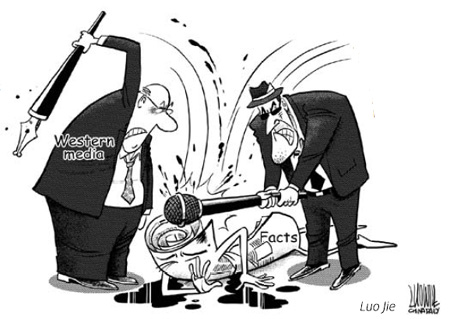Thursday, July 30, 2009
Land King! 地王!
You don't have to be the 'King of Pop' to get the media coverage and become a super hot topic in China. To be a 'Land King' is enough to make it a hot topic and get continuous and intensive media exposure in this country. What is a 'Land King'? 'Land King' in Chinese refers to the real estate developer who pays the highest land transfer price ever in history to buy a piece of land in a certain geographic area (e.g. a district in Beijing, a city, a province, or China). So, a property developer could be a 'Land King of Haidian District' if it pays the record high price in Haidian District to buy a chunk of land. The developer could also be a 'Land King of Beijing' if the price paid is also the highest price ever in Beijing.
Housing price has been the most talked-about topic in China for years. The surging housing price is the real pain for people living in Beijing, Shanghai and almost everywhere in this country. You MUST have your own house! That's what people think here. The financial crisis brought down the housing prices to the delight of prospective buyers. Apparently, the financial crisis was so 'weak'. The housing price plunged for a short period and begins to soar again! Record high prices have been paid for pieces of land in Beijing, Shanghai and Hangzhou respectively this year. When 'Flour (land) becomes more expensive than bread (house)', the price of the bread (house) will naturally go up. On June 30th, Fangxing Property, a subsidiary of state-owned Sinochem, acquired a chunk of land on Beijing's Guangqu Road for 4.06 billion yuan (US$59.7 million), the highest land transfer price ever in the city's public auction. Fangxing Property is not a big name developer in Beijing. But the developer successfully outbid big players such as SOHOChina, Vanke, Poly and was crowned the 'Land King' in Beijing. This has been big news recently. Those who were selling their houses in the nearby area had either increased the asking price dramatically or withdrawn their properties from the market to wait for a better time to sell. Pan Shiyi, the Chairman of SOHOChina, says to media that the record land price will surely push up housing prices in the nearby area of that piece of land. Understandably, he wasn't happy that SOHOChina failed to win the bid. However, he pointed out that his company could not compete with the less known Fangxing Property, a state-owned enterprise that had benefited from the government's 4 trillion yuan stimulus package and obtained huge loans from Chinese banks. Also, the 'Land King' in Hangzhou 'coincidentally' turned out to be a company with SOE background. I assume we can see clearly where China's soaring bank lending goes! It goes to SOEs and the real estate market (and the stock market, too?). Isn't the government trying to curb speculation in property market? We don't want to see so many 'Land Kings', especially the 'Land Kings' with SOE background! If the housing price continues to rise crazily, a 'HOMELESS' generation of young Chinese will soon come up!
Can you afford to buy an apartment for CNY13,000-24,000/sq. m. with a monthly salary of CNY 3,000-10,000 (before tax) in Beijing?
P.S. The 2008 average monthly salary of staff in Beijing is CNY3,322 (US$488.5).
Tuesday, July 14, 2009
It may take another 10 years ...
I've been following the news on Urumqi since the bloody riot broke out. As usual, I've read a lot of reports online from western news outlets, such as BBC, CNN, Reuters, Guardian, FT, WSJ, NYT and so on. I was once again disappointed by their 'fair and balanced' news coverage. Little improvement has been made from last year's coverage of Tibet. I've followed some western journalists on Twitter who are reporting from Urumqi. Strangely enough, the short messages they left on Twitter seemed to try to tell people what was going on there (the facts). But when the full news articles came out online, they never seemed to be balanced news coverage. Some western media even compared the 'peaceful protest' in Urumqi with the Tiananmen protest in 1989. What a joke! What an irony!
In 1989, Chinese people had no access to western media and few Chinese could speak and read English. I was till a child back then, but I clearly remembered my parents strongly support and sympathize those students who protested in Tiananmen because 'they were protesting against corruption'. Yes, my parents solely relied on CCTV for information then, but they supported the protesters! Now, 20 years later, more and more Chinese can speak English, and western media are more accessible. The number of Chinese who are studying, working and living abroad is huge and still growing. However, the overseas Chinese, fully exposed to western media and democracy are exactly those who are at the forefront of criticizing and protesting against biased western media. Does this mean anything to those western media? I'm afraid not. Eyes shut, ears closed.
Fortunately, I managed to read some balanced news articles on Guardian. So, there is till hope.
A few weeks ago, I left a comment under a post by a blogger, Aimee Barnes. The post had something to do with journalism and China. Then Aimee asked my opinion about something like how western journalists can improve news coverage of China. Honestly, I didn't give any opinion but said that I thought it might take another 10 years for western media to cover China with more fairness and balanced opinion. For some reason, my comment did not appear under that post. Anyway, it did not bother me.
I know a post like this will automatically get me the label of 'Chinese nationalist' from western media. Well, I think calling those Chinese who protest against biased news reports 'nationalists' is just CHEAP tactics. Wanna check how 'nationalist' is defined here?
In 1989, Chinese people had no access to western media and few Chinese could speak and read English. I was till a child back then, but I clearly remembered my parents strongly support and sympathize those students who protested in Tiananmen because 'they were protesting against corruption'. Yes, my parents solely relied on CCTV for information then, but they supported the protesters! Now, 20 years later, more and more Chinese can speak English, and western media are more accessible. The number of Chinese who are studying, working and living abroad is huge and still growing. However, the overseas Chinese, fully exposed to western media and democracy are exactly those who are at the forefront of criticizing and protesting against biased western media. Does this mean anything to those western media? I'm afraid not. Eyes shut, ears closed.
Fortunately, I managed to read some balanced news articles on Guardian. So, there is till hope.
A few weeks ago, I left a comment under a post by a blogger, Aimee Barnes. The post had something to do with journalism and China. Then Aimee asked my opinion about something like how western journalists can improve news coverage of China. Honestly, I didn't give any opinion but said that I thought it might take another 10 years for western media to cover China with more fairness and balanced opinion. For some reason, my comment did not appear under that post. Anyway, it did not bother me.
I know a post like this will automatically get me the label of 'Chinese nationalist' from western media. Well, I think calling those Chinese who protest against biased news reports 'nationalists' is just CHEAP tactics. Wanna check how 'nationalist' is defined here?
Wednesday, July 1, 2009
Economy cools while films get hotter
 'If You Are the One', a top performer at the Chinese box office (RMB 340 million)
'If You Are the One', a top performer at the Chinese box office (RMB 340 million)- A small number of homegrown films are making money. Most homegrown films are either losing money or merely at breakeven.
- It’s difficult to raise capital. Many film production companies spend more time raising capital rather than actually creating and producing films.
- Lack of original/excellent creation in film production.
- Box office is the only main revenue stream. More revenue streams need to be utilized.
In short, China’s film industry is prosperous and full of potential. However, there are still a lot of losers out there. It can be very risky to invest in this fast growing industry.
BTW, Transformers 2 has been on screen for a while and I will contribute 80 yuan to China’s box office sometime next week.
Related reading: China's film industry on fast track
Subscribe to:
Comments (Atom)







